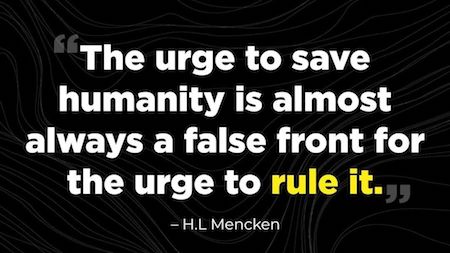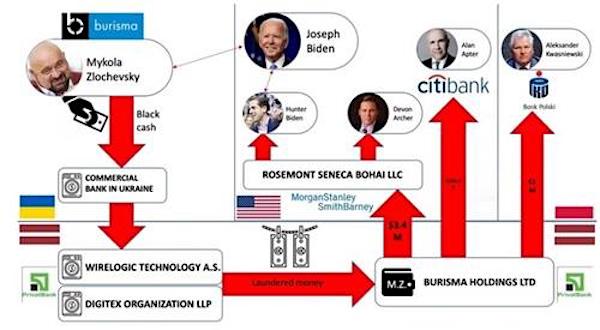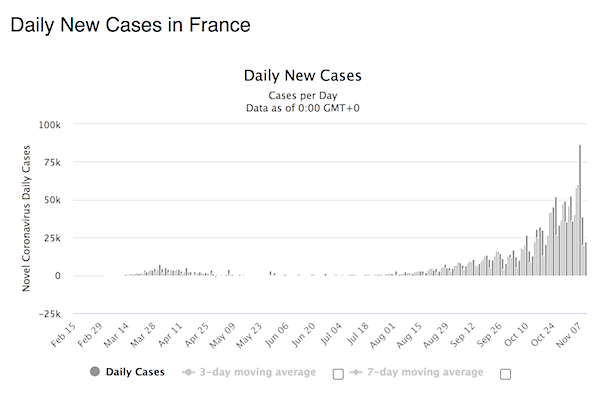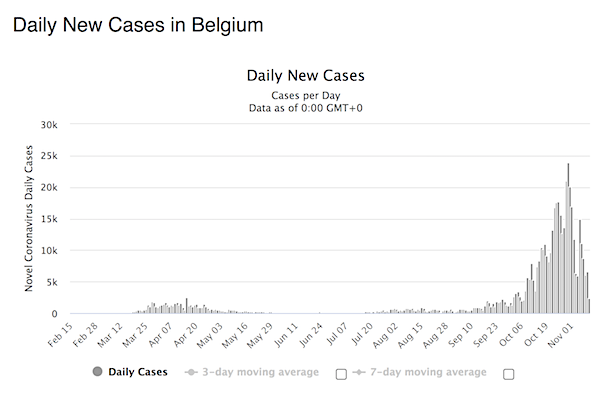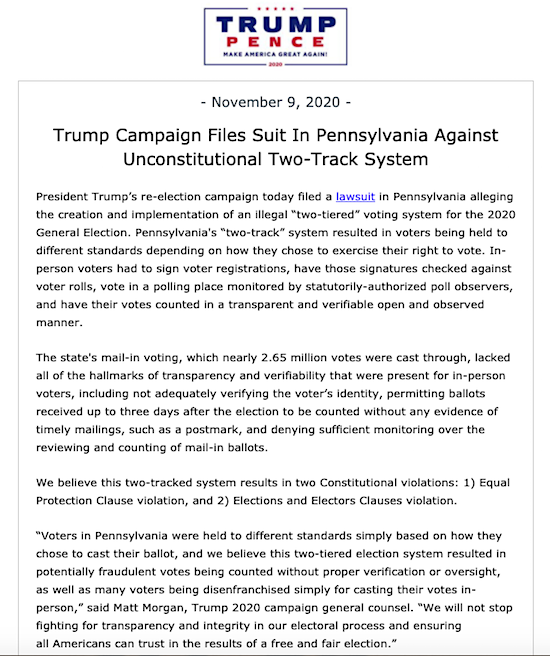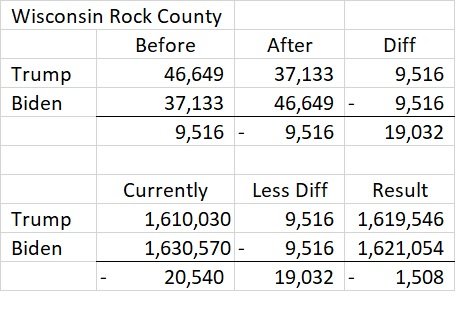
Salvador Dalí Cadaques 1923

If you think in terms of a year, plant a seed; if in terms of ten years, plant trees; if in terms of 100 years, teach the people.
– Confucius

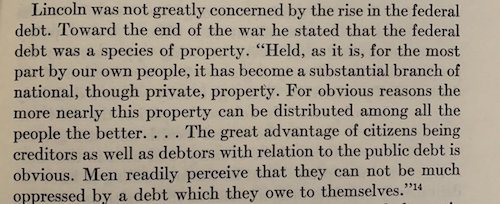

No efforts to prevent infection, other than lockdowns and masks. But an entire year of it. Based on the illusion that mass mRNA vaccination can achieve herd immunity.
The “science” has stood still for a year.
• Further Year Of Covid Curbs Needed – Irish Official (IT)
Another year of restrictions related to Covid-19 would be necessary before the number of people vaccinated would be sufficient to protect the public in general from the disease, a top health official has said. Meanwhile, close to 6,500 HSE staff are currently out sick with Covid-19, the HSE chief Paul Reid has stated. Dr Colm Henry, chief clinical officer at the HSE, said in radio comments that social distancing and restrictions in some form were likely for the rest of 2021 at least, until enough of the population could be vaccinated to grant general or herd immunity. “The answer, and not everyone likes it but it’s the truth… is that the public in general won’t have protection from Covid-19 for at least a year… In the meantime, it’s more important than ever to abide by the public health guidance so that we can stop the spread of the virus,” he told Máirín Ní Ghadhra on Raidió na Gaeltachta.
“We’re in the middle of the main wave now… and we can see the damage that has been wrought. The vaccine is coming, and we’ll come out of this if we can stick to the public health guidelines until everyone has been vaccinated.” Meanwhile, HSE chief executive Paul Reid said the hospital system is “completely tightening up” and has “formally gone into surge capacity”. The national critical care surge group had been mobilised and close to 6,500 HSE staff are currently out sick with Covid-19, with about 4,000 of those having been working in hospitals, he said.
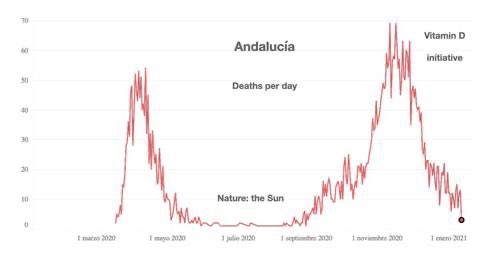

Not from the Pfizer PR squad.
• 55 Americans Died Following COVID Vaccination, Norway Deaths Rise To 29 (ZH)
Amid increasing calls for suspension of the use of mRNA-based COVID-19 vaccines produced by companies such as Pfizer, especially among elderly people, the situation in Norway has escalated significantly as the Scandi nation has now registered a total of 29 deaths among people over the age of 75 who’ve had their first COVID-19 vaccination shot. As Bloomberg reports, this adds six to the number of known fatalities in Norway, and also lowers the age group thought to be affected from 80. “Until Friday, Pfizer/BioNTech was the only vaccine available in Norway, and “all deaths are thus linked to this vaccine,” the Norwegian Medicines Agency said in a written response to Bloomberg on Saturday. “There are 13 deaths that have been assessed, and we are aware of another 16 deaths that are currently being assessed,” the agency said. All the reported deaths related to “elderly people with serious basic disorders,” it said.
[..] Norway’s experience has prompted the country to suggest that Covid-19 vaccines may be too risky for the very old and terminally ill… the exact group that ‘the science’ shows are actually at risk from this virus. Pfizer and BioNTech are working with the Norwegian regulator to investigate the deaths in Norway, Pfizer said in an e-mailed statement. The agency found that “the number of incidents so far is not alarming, and in line with expectations,” Pfizer said. However, it’s not just Norway as The Epoch Times’ Zachary Stieber reports that fifty-five people in the United States have died after receiving a COVID-19 vaccine, according to reports submitted to a federal system. Deaths have occurred among people receiving both the Moderna and the Pfizer-BioNTech vaccines, according to the reports. In some cases, patients died within days of receiving a COVID-19 vaccine.
“One man, a 66-year-old senior home resident in Colorado, was sleepy and stayed in bed a day after getting Moderna’s vaccine. Early the next morning, on Christmas Day, the resident “was observed in bed lying still, pale, eyes half open and foam coming from mouth and unresponsive,” the VAERS report states. “He was not breathing and with no pulse.” In another case, a 93-year-old South Dakota man was injected with the Pfizer-BioNTech vaccine on Jan. 4 around 11 a.m. About two hours later, he said he was tired and couldn’t continue with the physical therapy he was doing any longer. He was taken back to his room, where he said his legs felt heavy. Soon after, he stopped breathing. A nurse declared a do-not-resuscitate order.
In addition to the deaths, people have reported 96 life-threatening events following COVID-19 vaccinations, as well as 24 permanent disabilities, 225 hospitalizations, and 1,388 emergency room visits. It’s not just the old and frail, in Israel, which proudly lays claim to the greatest vaccination effort in the world (largest percentage of the population inoculated), As RT reports, at least 13 Israelis have experienced facial paralysis after being administered the Pfizer Covid-19 vaccine, a month after the US Food and Drug Administration reported similar issues but said they weren’t linked to the jab. Israeli outlet Ynet reported, citing the Health Ministry, that officials believe the number of such cases could be higher.
“For at least 28 hours I walked around with it [facial paralysis],” one person who had the side effect told Ynet. “I can’t say it was completely gone afterwards, but other than that I had no other pains, except a minor pain where the injection was, but there was nothing beyond that.” Ynet quoted Prof. Galia Rahav, director of the Infectious Diseases Unit at Sheba Medical Center, who said she did not feel “comfortable” with administering the second dose to someone who had received the first jab and subsequently suffered from paralysis. “No one knows if this is connected to the vaccine or not. That’s why I would refrain from giving a second dose to someone who suffered from paralysis after the first dose,” she told the outlet.

Ever more variants popping up.
• Second COVID Variant From Brazil ‘Likely’ Already In The UK (Sky)
The second of two new coronavirus variants from Brazil is likely to already be in the UK despite the government imposing a travel ban, a leading epidemiologist has warned. Eight cases of the first variant, which has a small number of mutations, have been identified in the UK. The second, which has been detected in the Brazilian city of Manaus and in travellers arriving in Japan, has not been detected in the UK so far. There are concerns that this variant could be more transmissible and reinfect those who have recovered from COVID, although such possibilities remain unproven. Professor John Edmunds has said he would it “unusual” if the second variant was not present here.
Professor Edmunds, a member of the government’s Scientific Advisory Group for Emergencies (SAGE), told BBC Radio 4’s Today programme: “In terms of the South African one, we had imported cases already by the time we put in additional restrictions for South African travellers. “For the Brazilian one… I don’t think there is evidence that we’ve imported cases of the Manaus strain, as far as I’m aware at least, but it is likely that we probably have quite honestly. “We are one of the most connected countries in the world so I would find it unusual if we hadn’t imported some cases into the UK.” The government banned flights from South America, Portugal and Cape Verde on Thursday after the emergence of the new variants, having previously banned travel from South Africa because of a new coronavirus mutation.
In addition, all quarantine-free travel into the UK will be suspended on Monday in a bid to keep out other variants. The new policy means arrivals from every destination will need to self-isolate for 10 days, or receive a negative result from a coronavirus test taken at least five days after they enter the UK. Labour accused the government of “closing the door after the horse has bolted”, saying the announcement was too late to have stopped the arrival of “worrying” strains.

Mental health.
• UK Children’s Welfare Becoming A National Emergency (G.)
Boris Johnson is facing demands from doctors, senior politicians and charities for a wide-ranging commission to examine the pandemic’s “devastating effect” on children, amid growing concerns about its impact on their education, development and mental health. A major coalition of child health experts warns that many families are being “swept into poverty” by the pandemic, which is set to significantly add to the 4 million children living in deprivation before the Covid crisis. In a letter to the Observer, they also warn of a “yawning gap” in attainment between rich and poor due to school closures, while the number of children facing mental health issues and distress will rise “with every day that lockdown keeps them isolated and uncertain about their futures”.
“Children’s welfare has become a national emergency,” says the letter, whose signatories include the Royal College of Paediatrics and Child Health, the National Children’s Bureau and some of the country’s leading child health academics. “An independent commission, to inform a cross-government strategy to steer children and young people clear from the lingering effects of Covid-19, could avert this deepening crisis. At present we have piecemeal solutions and stop-gap measures. The next generation deserves better.” It warns that the challenges have been made harder by a decade of cuts to services families rely on. Some 1.5 million children under 18 will either need new or additional mental health support as a result of the pandemic.
A third of those are new cases, according to the Centre for Mental Health. Lee Hudson, a consultant paediatrician and chief of mental health at Great Ormond Street hospital, said: “We know from the data that children and young people’s mental health has been deteriorating in this pandemic. Clinicians are seeing the effects of that every day: for example, the numbers of children presenting with eating disorders have dramatically increased. For children living in poverty, the risks are even greater. We’ve never needed a long-term strategy for child mental health more.”

Remember the $10 trillion stimulus in a $21 trillion economy.
• A Year Of Lockdowns Can’t Take The Shine Off Goldmans Sachs Profits (G.)
What is $900m to a Wall Street giant like Goldman Sachs? Relatively little, when it counts the drop in profits for a year of record-setting market swings and economic turmoil, all sparked by a pandemic. The firm should regard itself as lucky to be poised for profits of about $7bn (£5bn) for the whole of 2020. That average analyst forecast, compiled by Refinitiv, is a mere 11% drop from the $7.9bn it made in 2019, a year when the phrase “Covid lockdown” had never been uttered. The projected decline is smaller than the $2.8bn it put aside to cover a potential jump in defaults within the first nine months of the year alone, a number estimates suggest could rise to $3.1bn for the 12 months to December.
Those provisions pale in comparison with those of European peers such as HSBC, which already put by $7.6bn to cover Covid-linked loan losses by the third quarter. The bank’s results will emerge unscathed from the $2.9bn settlement it reached in October with global regulators and the US Department of Justice, over its alleged role in the 1MDB corruption scandal. The announcement came just months after Goldman agreed to pay $3.9bn to the Malaysian government, amid claims it allegedly turned a blind eye while $4.5bn was looted from the country’s sovereign wealth fund. Goldman bosses, including chairman and chief executive David Solomon, will feel the pinch of a $31m cut to their combined 2020 pay over the scandal, but hefty provisions previously put aside for the 1MDB case will largely cover the settlements.

The GOP is tempted to turn on Trump. Opportunism pur sang.
• Trump Trial Pending, McConnell Calls It ‘Vote Of Conscience’ (AP)
President Donald Trump’s impeachment trial is likely to start after Joe Biden’s inauguration, and the Republican leader, Mitch McConnell, is telling senators their decision on whether to convict the outgoing president over the Capitol riot will be a “vote of conscience.” The timing for the trial, the first of a president no longer in office, has not yet been set. But House Speaker Nancy Pelosi made it clear Friday that Democrats intend to move swiftly on Biden’s $1.9 trillion COVID aid and economic recovery package to speed up vaccinations and send Americans relief. Biden is set to take the oath of office Wednesday. Pelosi called the recovery package a “matter of complete urgency.”
The uncertainty of the scheduling, despite the House’s swift impeachment of Trump just a week after the deadly Jan. 6 siege, reflects the fact that Democrats do not want the Senate trial to dominate the opening days of the Biden administration. With security forces on alert over the threat of more potential violence heading into the inauguration, the Senate is also moving quickly to prepare for confirming Biden’s nominee for national intelligence director, Avril Haines. A committee hearing is set for the day before the inauguration, signaling a confirmation vote could come swiftly once the new president is in office.
Many Democrats have pushed for an immediate impeachment trial to hold Trump accountable and prevent him from holding future office, and the proceedings could still begin by Inauguration Day. But others have urged a slower pace as the Senate considers Biden’s Cabinet nominees and the newly Democratic-led Congress considers priorities like the coronavirus plan. Biden’s incoming White House press secretary, Jen Psaki, said Friday the Senate can do both. “The Senate can do its constitutional duty while continuing to conduct the business of the people,” she said. Psaki noted that during Trump’s first impeachment trial last year, the Senate continued to hold hearings each day. “There is some precedent,” she said.

“It was a reckless speech — but, in a court of law, it would constitute protected speech.”
• Should Donald Trump Skip Out On The Senate Impeachment Trial? (Turley)
In a matter of days, this country will face an unprecedented Senate trial. The Senate not only will try a president for a second time but will do so after he has left office. Vice President-elect Kamala Harris assures us the Senate can politically “multitask” to deal with an impeachment, an incoming Biden administration and a pandemic. However, the threshold question is whether this is constitutionally one of those tasks — and for soon-to-be citizen Donald Trump, the best defense may be no defense at all. In fairness, people on both sides are struggling to deal with this novel impeachment. While I have stated that I do not wish to serve as the president’s counsel, I have spoken to members of Congress and the White House on the historical and constitutional backgrounds for a trial.
From a purely strategic perspective, I believe Trump may be wise to skip any trial. For a notorious counterpuncher, avoiding a fight might be the most difficult decision of all, particularly because he has obvious defenses. First, he was denied due process when the House held an unprecedented “snap impeachment” without a hearing or inquiry even though a trial likely would not occur immediately. Even a one-day hearing would have allowed evidence to be discussed as well as a formal request for a response. Second, the impeachment article is poorly crafted and poorly conceived, built around assertions that Trump’s Jan. 6 speech to supporters was an “incitement to insurrection.” His speech raised potentially impeachable grounds; I condemned it as he gave it and opposed his challenge of electoral votes from the outset.
But as I wrote previously, it would have been far better to censure him for it in a bipartisan, bicameral resolution. While impeachment can be based on noncriminal grounds, Trump’s speech alone did not amount to criminal incitement. Absent direct evidence of intent, a criminal charge would likely collapse in an actual trial or on appeal on First Amendment grounds. Trump expressly called for his supporters “to peacefully and patriotically make your voices heard.” He told them to go to the Capitol “to cheer on our brave senators and congressmen and women,” to “fight like hell” to challenge the election, and to remind unsupportive Republicans that their actions would not be forgotten. It was a reckless speech — but, in a court of law, it would constitute protected speech.

Globalism wins.
• Biden Fills Out State Department Team With Obama Veterans (AP)
President-elect Joe Biden on Saturday filled out his State Department team with a group of former career diplomats and veterans of the Obama administration, signaling his desire to return to a more traditional foreign policy after four years of uncertainty and unpredictability under President Donald Trump. Biden will nominate Wendy Sherman as deputy secretary of state and Victoria Nuland as undersecretary of state for political affairs — the second- and third-highest ranking posts, respectively. They were among the 11 officials announced to serve under the incoming secretary of state, Antony Blinken. The team “embodies my core belief that America is strongest when it works with our allies,” Biden said in a statement. He said he was confident “they will use their diplomatic experience and skill to restore America’s global and moral leadership. America is back.”
Among the others are: —longtime Biden Senate aide Brian McKeon, to be deputy secretary of state for management. That deputy position has been vacant for some time and McKeon and Sherman are expected to share duties as the department’s No. 3 official. —former senior diplomats Bonnie Jenkins and Uzra Zeya, to be under secretary of state for arms control and undersecretary of state of democracy and human rights, respectively. —Derek Chollet, a familiar Democratic foreign policy hand, to be State Department counselor. —former U.N. official Salman Ahmed, who also served as head of strategic planning in the Obama National Security Council, as director of policy planning. —Suzy George, who was a senior aide to former Secretary of State Madeleine Albright, will be Blinken’s chief of staff. —Ned Price, a former Obama NSC staffer and career CIA official who resigned in protest in the early days of the Trump administration, will serve as the public face of the department, taking on the role of spokesman.

I’m not a fan of Niall Ferguson at all, but the topic demands attention.
• Silicon Valley Can No Longer Conceal Its Power (Ferguson)
‘To see what is in front of one’s nose needs a constant struggle,’ George Orwell famously observed. He was talking not about everyday life but about politics, where it is ‘quite easy for the part to be greater than the whole or for two objects to be in the same place simultaneously’. The examples he gave in his 1946 essay included the paradox that ‘for years before the war, nearly all enlightened people were in favour of standing up to Germany: the majority of them were also against having enough armaments to make such a stand effective’. Last week provided a near-perfect analogy. For years before the 2020 election, nearly all American conservatives were in favour of standing up to big tech: the majority of them were also against changing the laws and regulations enough to make such a stand effective.
The difference is that, unlike the German threat, which was geographically remote, the threat from Silicon Valley was literally in front of our noses, day and night: on our mobile phones, our tablets and our laptops. Writing in this magazine more than three years ago, I warned of a coming collision between Donald Trump and Silicon Valley. ‘Social media helped Donald Trump take the White House,’ I wrote. ‘Silicon Valley won’t let it happen again.’ The conclusion of my book The Square and the Tower was that the new online network platforms represented a new kind of power that posed a fundamental challenge to the traditional hierarchical power of the state. By the network platforms, I mean Facebook, Amazon, Twitter, Google and Apple, or FATGA for short — companies that have established a dominance over the public sphere not seen since the heyday of the pre-Reformation Catholic Church.
FATGA had humble enough origins in garages and dorm rooms. As recently as 2008, not one of them could be found among the world’s largest companies by market capitalisation. Today, they occupy first, third, fourth and fifth places in the market cap league table, just above their Chinese counterparts, Tencent and Alibaba. What happened was that the network platforms turned the originally decentralised worldwide web into an oligarchically organised and hierarchical public sphere from which they made money and to which they controlled access. That the original, superficially libertarian inclinations of these companies’ founders would rapidly crumble under political pressure from the left was also perfectly obvious, if one bothered to look a little beyond one’s proboscis.
Following the violent far-right rally at Charlottesville in August 2017, Matthew Prince, chief executive of the internet service provider Cloudflare, described how he had responded: ‘Literally, I woke up in a bad mood and decided someone shouldn’t be allowed on the internet.’ On the basis that ‘the people behind the [white supremacist magazine] Daily Stormer are assholes’, he denied their website access to the internet. ‘No one should have that power,’ he admitted. ‘We need to have a discussion around this with clear rules and clear frameworks. My whims and those of Jeff [Bezos] and Larry [Page] and … Mark [Zuckerberg] shouldn’t be what determines what should be online.’
How the news works
This is how the news works.
— russ (@RussellOkung) January 16, 2021

No, sorry, that is not inflation.
• Massive Inflation in Shipping Costs. And the Reasons (WS)
The dollar-amount spent by shippers, such as manufacturers or retailers, on shipping their goods jumped by 13% in December from a year earlier, driving the Cass Freight Index of Expenditures to a new record (red line). The amount spent on freight is a function of shipment volume and freight rates:
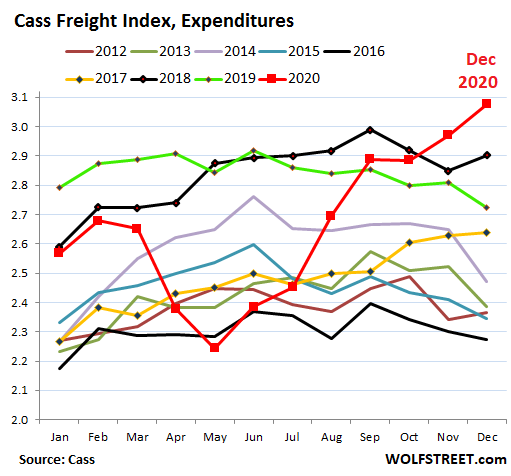
The Cass Freight Index covers shipments by all modes of transportation, but is heavily concentrated on shipments by truck, with truckload accounting for over half of the expenditures, followed by less-than-truckload (LTL), rail, parcel services, etc. It does not cover commodities. The freight rates embedded in the index jumped by 6.0% in December compared to a year earlier. “Based in part on spot trends, the acceleration in freight rates is likely to persist in the coming months,” Cass said in the report. Shipment volume surged 6.7% year-over-year, given the Pandemic shift in consumer spending to goods that need to be shipped, from services that are not shipped. But shipment volume in December (red line in the chart below) remained below the levels of 2018 (black) and 2017 (brown) at this time of the year:
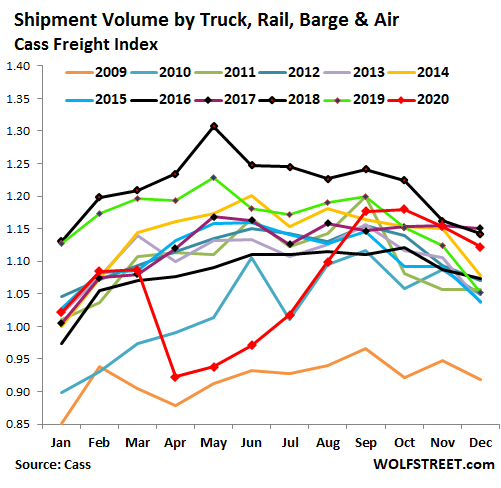

To understand why, look no further than who organized and paid for the Steele dossier.
• FBI, State Officials Aware Early Of Major Steele Mistake, Ignored It (JTN)
Shortly before the FBI used his dossier to secure a surveillance warrant targeting the Trump campaign, Christopher Steele met with State Department officials and relayed information suggesting Moscow was running an operation out of the Russian consulate in Miami. There was just one problem with his intelligence: The Russians didn’t have a consulate in Florida’s largest city. The anecdote, captured in contemporaneous memos and newly released testimony, illustrates just how bad some of Steele’s intelligence reporting was and how widely that was known inside the FBI, even as the Foreign Intelligence Surveillance Court was being assured by the bureau that Steele was deemed credible and there was no derogatory information about his work.
Kenneth Laycock, the FBI’s current Executive Assistant Director, was a section chief for Eurasian intelligence in fall 2016 when Steele made a visit to Deputy Assistant Secretary of State Kathleen Kavalec at the State Department. During the October 2016 meeting, Steele admitted he was leaking to the news media while working as an FBI informant, a violation of his confidential human source agreement. (He later was terminated for it.) And he also relayed the anecdote about the Russian operation out of the Miami consulate, which officials immediately flagged as false, according to Kavalec’s own notes of the meeting. “It is important to note that there is no Russian Consulate in Miami,” Kavalec wrote.
Laycock said Kavalec relayed her concerns to the FBI and that others working on the now-discredited Russia collusion investigation codenamed Crossfire Hurricane were also aware of Steele’s mistake. “Do you recall — just trying to jog your memory here in case you do recall — Ms. Kavalec conveying information to you that Steele conveyed to her information about a Russian consulate being located in Miami and that was an inaccurate assessment on Steele’s part?” a Senate investigator asked Laycock in testimony taken last year but made public on Friday by the Senate Judiciary Committee, “I recall a conversation about a consulate in Miami independent of what she had mentioned regarding what Mr. Steele said to her,” Laycock answered.
He added: “It came up in some other discussion regarding if there was a consulate in Miami, which we both knew is not true because we know where all the consulates and embassies are around the country. That’s where I would handle normally in my purview as the section chief of the Eurasia program. So when it came up in a discussion, it was like, we don’t have a consulate in Miami.” He said FBI headquarters was aware of Steele’s mistaken claim outside of Kavalec’s report as well. “Yes, independent of the Mr. Steele piece in here, it came up through other discussions,” he testified.

“The Democrats are very good at creating a brand that is radically different from their reality.”
• Democrats Still Serve Militarism And Corporatism – Glenn Greenwald (RT)
Democrats are cheering for censorship as a means to root out “fascism,” even as they serve corporate interests that continue to exacerbate the social and economic issues that gave rise to Donald Trump, Glenn Greenwald told RT. The acclaimed American journalist issued a scathing critique of the American Left during a conversation with Chris Hedges, host of RT’s On Contact. The interview will air in full on Sunday. Pointing to Donald Trump’s indefinite Twitter suspension, Greenwald accused Democrats of appealing to Big Tech to police speech that could undermine their hold on power, using the pretext of fighting far-right extremism to quash dissent. “They’re on their knees pleading with billionaires and oligarchs and monopolists and Silicon Valley to censor in a way that they believe is politically advantageous.”
He added that the crackdown on free speech was particularly egregious because it was being carried out by a “tiny number of Silicon Valley oligarchs” who operate outside of the realm of democratic accountability. Greenwald argued that the profoundly illiberal cheerleading for corporate speech-policing should come as no surprise to anyone, noting that the Democratic Party is funded by and “believes in” corporate power, despite whatever claims it makes to the contrary. “The Democrats are very good at creating a brand that is radically different from their reality. But essentially the Democratic Party serves militarism, imperialism, and corporatism.”
There should also be no illusions about whether the incoming Biden administration will be able to mend the deep political divide in the country, the American journalist warned. He agreed with Hedges’ premise that Trump won the White House in 2016 by capitalizing on widespread frustration over Barack Obama, and his VP Joe Biden’s, ineffectual eight years in office.

We try to run the Automatic Earth on donations. Since ad revenue has collapsed, you are now not just a reader, but an integral part of the process that builds this site. Thank you for your support.





Support the Automatic Earth in 2021. Click at the top of the sidebars to donate with Paypal and Patreon.



